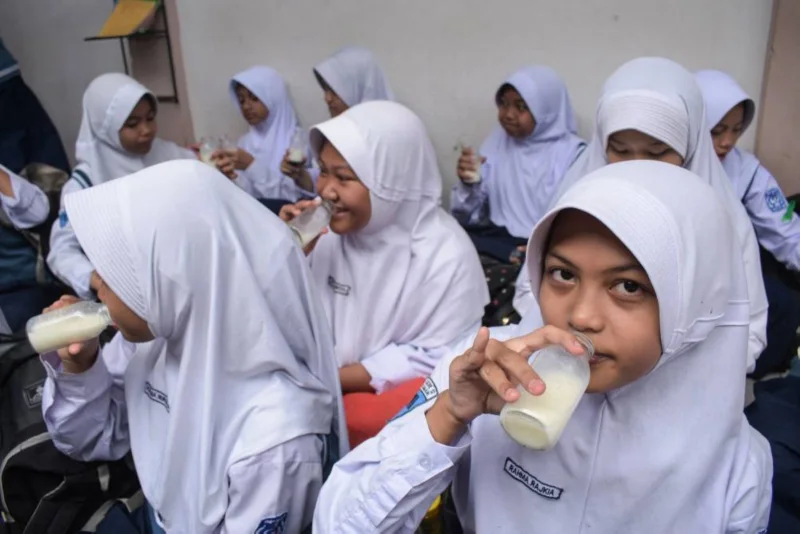Indonesia Launches $28 Billion Nationwide Program to Combat Malnutrition and Stunting

The initiative comes as Subianto, elected last year to lead Southeast Asia’s largest economy, aims to tackle the stunted growth affecting 21.5% of Indonesian children under five. He envisions the program as a cornerstone of broader economic growth, pledging to accelerate GDP expansion to 8% from its current 5%.
A Pledge for a “Golden Indonesia” by 2045
In his October inauguration speech, Subianto highlighted the severe impact of malnutrition on the country’s youth. His strategy includes free school lunches and milk for 83 million students across over 400,000 schools, a step toward cultivating a “Golden Indonesia” generation by 2045.
“Too many of our brothers and sisters live below the poverty line, and too many children attend school hungry or without proper clothing,” Subianto stated.
Indonesia’s Minister of Cooperatives, Budi Arie Setiadi, attended the program’s launch at Angkasa 5 Elementary School in Jakarta, highlighting its significance.
Logistics and Economic Ambitions
The program, expected to cost upwards of 450 trillion rupiah ($28 billion), will initially target 19.47 million schoolchildren and pregnant women by 2025 with an annual budget of 71 trillion rupiah ($4.3 billion). Dadan Hindayana, head of the newly established National Nutrition Agency, outlined the plan:
“We estimate this will require 6.7 million tonnes of rice, 1.2 million tonnes of chicken, 500,000 tonnes of beef, 1 million tonnes of fish, and 4 million kiloliters of milk annually,” Hindayana said, noting plans to establish at least 5,000 kitchens nationwide.
On Monday, trucks delivered 3,000 meal portions to SD Cilangkap 08, a primary school in Depok. Plates filled with rice, stir-fried vegetables, tempeh, chicken, and oranges were distributed to 740 students.
“The meals cover a third of children’s daily caloric needs,” Hindayana explained, adding that meals are free for recipients, from early childhood education through senior high school.
Skepticism and Fiscal Concerns
Despite the program’s noble goals, critics question its feasibility. Economic researcher Nailul Huda from the Center of Economic and Law Studies warned of potential fiscal strain.
“Given Indonesia’s tight fiscal conditions, financing this program could lead to increased national debt,” Huda said. “The program’s scale, logistics, and the state’s financial capacity raise serious concerns.”
Huda also cautioned that the program could exacerbate Indonesia’s trade deficit, as the country heavily relies on imports for rice, wheat, soybeans, beef, and dairy products.
However, Reni Suwarso, director of the Institute for Democracy, Security, and Strategic Studies, argued that the program is essential given Indonesia’s high stunting rates. According to the 2023 Indonesian Health Survey, stunting prevalence dropped to 21.5% from 22.3% the previous year, but the reduction is still far from the 14% target for 2024. UNICEF data underscores the urgency, estimating one in 12 Indonesian children under five are wasted, while one in five are stunted.
“Malnutrition has dire consequences,” Suwarso emphasized. “We must address this crisis to safeguard the health and development of our children and secure Indonesia’s future.”
As the government pushes forward with its Free Nutritious Meal program, all eyes are on whether this ambitious initiative can deliver its promises without jeopardizing economic stability.










